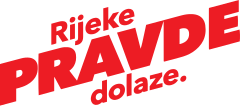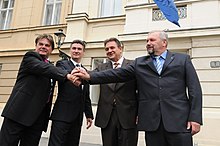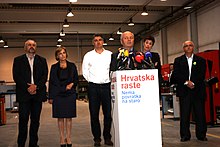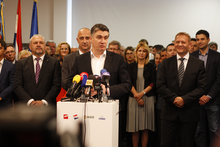Rivers of Justice
Rivers of Justice Rijeke pravde | |
|---|---|
 | |
| Leader | Peđa Grbin |
| Founder | Zoran Milanović |
| Founded | 23 November 2010 |
| Headquarters | Zagreb, Croatia |
| Ideology | Social democracy Social liberalism Progressivism |
| Political position | Centre to centre-left |
| Slogan | "Rivers of justice are coming"[1] ("Rijeke pravde dolaze") |
| Sabor | 42 / 151 |
| European Parliament[a] | 4 / 12 |
| County Prefects[b] | 2 / 21 |
| Mayors | 24 / 128 |
Rivers of Justice (Croatian: Rijeke pravde)[2] is a centre-left political alliance in Croatia. The coalition was originally formed in 2010 as the Kukuriku Coalition (Kukuriku koalicija). This somewhat facetious name meaning 'cock-a-doodle-doo', taken from a restaurant of the same name in Kastav where the coalition leaders first convened in July 2009, became well known and was eventually taken as the coalition's official name.[3][4][5] The coalition originally consisted of four centrist and centre-left parties in the Croatian Parliament: the Social Democratic Party of Croatia (SDP), Croatian People's Party – Liberal Democrats (HNS-LD), Croatian Party of Pensioners (HSU) and Istrian Democratic Assembly (IDS).[6] The coalition won an absolute majority of seats in the 2011 parliamentary election and successfully formed a government led by Zoran Milanović (SDP).
In the 2014–15 presidential election the coalition supported the candidacy of incumbent president Ivo Josipović. He was, however, defeated by Kolinda Grabar-Kitarović of the centre-right Croatian Democratic Union (HDZ), becoming the first Croatian president to not win re-election.
For the 2015 parliamentary election, the coalition changed its name into Croatia is Growing (Hrvatska raste) - in reference to the continuous growth of economic indicators such as the GDP, industrial production, exports, and employment rate, which was achieved in the last two years of the mandate of the Milanović's government. The coalition was later joined by the Croatian Labourists – Labour Party (HL), Croatian Peasant Party (HSS) and Zagorje Party (ZS), while the IDS in turn left it. Nevertheless, the leader of the IDS, Boris Miletić, explicitly pointed out that his party would still continue to collaborate with the coalition. After the coalition failed to achieve a post-electoral agreement with the Bridge of Independent Lists (MOST) on the formation of the new government, it was required to move into the opposition.
On 16 July 2016, the SDP, HNS-LD, HSU and the HSS signed coalition agreement in Zabok and thus re-established the coalition under a new name - the People's Coalition (Narodna koalicija). Following the election, the coalition once again failed to return to the government and thus remained in the opposition.
The coalition's founder, former prime minister Zoran Milanović, was elected the 5th president of Croatia in the 2019–20 presidential election. He did so by defeated the incumbent, Kolinda Grabar-Kitarović, of the ruling HDZ.
In the run-up to the 2020 parliamentary election five parties agreed to form the Restart Coalition (Restart koalicija). These are the SDP, HSS, HSU, Civic-Liberal Alliance (GLAS) and Power - Party of People's and Civic Engagement (SNAGA), respectively. In May 2020 the coalition was joined by the Damir Bajs Independent List party and the Democratic Alliance of Međimurje,[7][8] while in June 2020 the coalition was further expanded to include the Istrian Democratic Assembly and the Alliance of Primorje-Gorski Kotar (PGS).[9][10] On 10 June 2020 Darinko Dumbović, the mayor of Petrinja, and a member of Parliament for the People's Party – Reformists (NS-R), signed a coalition agreement with the Restart Coalition in the 6th electoral district.[11] Furthermore, on 12 June the Restart Coalition reached an agreement with Matija Posavec, the independent prefect of Međimurje County, on a joint electoral list for the 3rd electoral district.[12]
History[edit]



Kukuriku Coalition[edit]
The idea of a joint party list of the main centre-left parties, the Social Democratic Party of Croatia (SDP) and Croatian People's Party (HNS-LD), was discussed in the 2007 general election, however ultimately each party contested the election separately.[13] The election resulted in HDZ forming a Government led by Ivo Sanader and SDP and HNS-LD remaining in Opposition. After the resignation of Prime Minister Sanader in 2009, SDP, HNS-LD and the Istrian Democratic Assembly (IDS) started discussing the possibility of contesting the 2011 parliamentary election more extensively.[14] On 23 November 2010 the three parties along with HSU signed a declaration "Alliance for Change" officially confirming their intention of a joint appearance in the next election.[15]
On 15 September 2011, the coalition launched their manifesto for the 2011 general election called "Plan 21" in Zagreb.[3][4] In 2011 elections Coalition won the majority in 8 out of 10 electoral districts which resulted in gaining 81 out of 151 seats in the Parliament. On 23 December 2015, the coalition formed the 10th Croatian Government led by Zoran Milanović. The coalition participated on the 2013 European Parliament election and won 5 out of 12 Croatian seats. For the 2014 European Parliament election, the coalition was joined by the Independent Democratic Serb Party eventually winning 4 out of 11 Croatian seats.
Croatia is Growing[edit]
For the 2015 parliamentary elections, the coalition changed its name into Croatia is Growing, and was joined by Croatian Labourists – Labour Party (HL), Croatian Peasant Party (HSS) and Zagorje Party (ZS), while the IDS left. Nevertheless, leader of IDS Boris Miletić explicitly pointed out that his party would still continue to collaborate with the coalition, and later took an active part in the 2015 post-election negotiations on forming new government as de facto member of the coalition. The coalition eventually ended up winning the majority in 5 out of 10 electoral districts and eventually gained 56 out of 151 seats in the Parliament. After more than 40 days of negotiations with the Bridge of Independent Lists (MOST) and numerous twists and turns mainly due to MOST frequently changing terms, the coalition failed to achieve agreement with MOST on forming new government, which was formed by the independent Tihomir Orešković who was supported by the centre-right alliance, the Patriotic Coalition. Coalition party members returned to the opposition. On 9 April 2016, president of HNS-LD, Ivan Vrdoljak, announced that the coalition ceased to exist since each party had its own parliamentary club adding that his party would still cooperate with its former coalition allies.[16]
People's Coalition[edit]
On 9 July 2016, Zoran Milanović announced that the SDP, HNS-LD and Croatian Party of Pensioners (HSU) would form the People's Coalition (Narodna koalicija) for the 2016 parliamentary election, adding that the coalition would be ideologically far-reaching and diverse, as it also encompasses the centre-right Croatian Peasant Party (HSS).[17] The three centre-left parties previously formed the Croatia is Growing coalition with the Croatian Labourists – Labour Party and two smaller parties winning 56 seats in the November 2015 parliamentary election, while the HSS contested the elections as part of the Patriotic Coalition which won 59 seats (2 of those going to HSS itself). One of HSS's two parliamentary representatives and former leader Branko Hrg left the party after the party joined the coalition.[18] On the other hand, Authentic Croatian Peasant Party and Croatian Peasant Party of Radić Brothers which had more than 6.000 members decided to merge into HSS after they split from it in 2007 dissatisfied with HSS's cooperation with the Croatian Democratic Union (HDZ).[19]
Restart Coalition[edit]
On 9 May 2020, the SDP, HSS, HSU, Civic-Liberal Alliance (Glas) and Power – Party of People's and Civic Engagement (SNAGA), launched a joint electoral programme and announced the beginning of their campaign for the 2020 parliamentary election.[2] In mid-May 2020 the party led by Bjelovar-Bilogora County prefect Damir Bajs – called the Damir Bajs Independent List – joined the coalition.[7] It was followed a few days later by the Democratic Alliance of Međimurje (MDS).[8] In June 2020 the coalition was expanded when the original member parties agreed to terms set out by the Istrian Democratic Assembly (IDS) and the Alliance of Primorje-Gorski Kotar (PGS) for joining the common electoral lists. Namely, the IDS and the PGS had asked the Restart Coalition for certain reassurances, including a promise that Istria would be maintained as a separate political unit in any future administrative reform of Croatia's existing system of counties.[9][10] Furthermore, in addition to its national-level coalition agreements, the Restart Coalition has also formed joint electoral lists with several parties and independent individuals at an electoral district level. These include Petrinja mayor and Member of Parliament Darinko Dumbović of the People's Party – Reformists (in the 6th electoral district),[11] as well as non-partisan Međimurje County prefect Matija Posavec (in the 3rd electoral district).[12] The Restart Coalition is led by SDP chairman Davor Bernardić, who is thus the alliance's prime-ministerial candidate.
Rivers of Justice[edit]
The Social Democratic Party announced negotiations for another center-left coalition on 5 March 2024, about a month before the elections. Originally dubbed "Coalition for a Better Croatia" (Croatian: Koalicija za bolju Hrvatsku), the SDP thus began their campaign for the 2024 parliamentary election. This coalition aimed to unite a total of 10 parties: the SDP, HSS, IDS, PGS, the Centre, Focus, the Reformists, the Workers' Front (RF), Glas and People with a First and Last Name ("DO i SIP" or simply IP), and was conceived of as a reaction to the large number of corruption scandals involving ministers of the ruling party, HDZ, over their two mandates in power.[20]
Despite originally intending for chairman Peđa Grbin to be the prime-ministerial candidate,[21][22] the SDP organized a press conference on Friday 15 March 2024, where Zoran Milanović, the acting president of Croatia, made a surprise announcement of his candidature both on the SDP's electoral list for parliament and for the function of SDP's prime minister as an independent. The announcement was concluded with the line "The rivers of justice are coming, they will overflow come spring",[23] taken from Jura Stublić's song Rijeke pravde (English: The Rivers of Justice).[24] Milanović intended to resign from the office of president before being sworn into the position of prime minister,[25] thus circumventing the constitutional prohibition of the President of Croatia from participating in party politics or holding another public office—something that Grbin preemptively inquired about via a letter to the Constitutional Court of Croatia.[26] The move was, however, first scrutinized by constitutional experts and political opposition over the following weekend, claiming the candidacy was "unconstitutional",[27][28][29] with acting prime minister, Andrej Plenković, calling it a "mini coup d'etat".[30] After convening on Monday 18 March 2024, the Constitutional Court delivered a non-unanimous verdict (with 2 justices voting against, and 2 refusing to vote), opining that Milanović's candidacy from the position of president of the Republic was unconstitutional and warning the SDP against promoting him as part of the campaign or as a political candidate for as long as he remains president, lest the elections be postponed or their results rejected.[31] Consequently, Grbin affirmed they will comply with the verdict,[32] but decided to rename the coalition to Rivers of Justice in reference to Milanović's announcement.[33] Both Grbin and Milanović claimed that the court's verdict is an "attempt at a coup" that "certain individuals"[34] organized by relying on personal connections to the president of the Constitutional Court.[33][35] Milanović later announced that he still intends to become the prime minister "legally and courteously", but refused to reveal how, emphasizing that a vote for any party other than the HDZ is "good".[36]
In reaction to Milanović's planned candidacy, three parties left the negotiations for the coalition: RF, Focus and the IDS.[37] Although the SDP decided to stop negotiations with them due to unnamed disagreements, the RF cited political and ideological disagreements with Milanović that would have caused them to drop out of the coalition regardless.[38] On the other hand, Focus and the IDS decided to back away mainly due to disagreements with the candidacy itself, arguing that they do not wish to back unconstitutional political maneuvers, as well as due to miscellaneous disagreements with other practices of the SDP, such as aggressive political rhetoric and generally poor negotiation.[39][40]
Member parties[edit]
| Party | Abbr. | Ideology | Leader | Seats | Member | |
|---|---|---|---|---|---|---|
| Social Democratic Party of Croatia | SDP | Social democracy Pro-Europeanism |
Peđa Grbin | 13 / 151
|
2011– | |
| Croatian Peasant Party | HSS | Agrarianism Liberalism |
Krešo Beljak | 2 / 151
|
2016–2023, 2024–[41] | |
| Civic Liberal Alliance | Glas | Social liberalism | Anka Mrak-Taritaš | 1 / 151
|
2020– | |
| People's Party – Reformists |
NS-R | Liberalism | Radimir Čačić | 1 / 151
|
2020–2023,[c] 2024–[41] | |
| Centre |
Centar | Liberalism | Ivica Puljak | 1 / 151
|
2024–[41] | |
| Dalija Orešković and People with a First and Last Name |
DO i SIP | Anti-corruption | Dalija Orešković | 1 / 151
|
2024–[41] | |
Former members[edit]
Election results[edit]
Parliamentary elections[edit]
| Election | Leader | Coalition name | Popular vote | % of popular vote | Overall seats won | Seat change (compared to previous election) |
Government |
|---|---|---|---|---|---|---|---|
| 2011 | Zoran Milanović | Kukuriku Coalition | 958,312 | 40.0% | 81 / 151 [d]
|
government | |
| 2015 | Croatia is Growing | 744,507 | 32.31% | 59 / 151 [e]
|
opposition | ||
| 2016 | People's Coalition | 636,602 | 33.82% | 56 / 151 [f]
|
opposition | ||
| 2020 | Davor Bernardić | Restart Coalition | 414,615 | 24.87% | 41 / 151 [g]
|
opposition |
Presidential elections[edit]
| Election | Candidate | Party | 1st round | 2nd round | Result | ||||
|---|---|---|---|---|---|---|---|---|---|
| Rank | # of overall vote | % of overall vote | Rank | # of overall vote | % of overall vote | ||||
| 2014–15 | Ivo Josipović | SDP | #1 | 687,678 | 38.46 | #2 | 1,082,436 | 49.26 | Lost |
| 2019–20 | Zoran Milanović | SDP | #1 | 562,783 | 29.55 | #1 | 1,034,170 | 52.66 | Won |
European Parliament elections[edit]
| Election | Leading candidate | Coalition name | Popular vote | % of popular vote | Overall seats won | Seat change |
|---|---|---|---|---|---|---|
| 2013 | Tonino Picula | Kukuriku Coalition | 237,778 | 32.07% | 5 / 12 [h]
|
|
| 2014 | Neven Mimica | 275,904 | 29.93% | 4 / 11 [i]
|
Former logos[edit]
-
Kukuriku Coalition
2011–2015 -
Croatia is Growing
2015 -
People's Coalition
2016 -
Restart Coalition
2020
See also[edit]
Notes[edit]
- ^
- ^
- Željko Kolar (SDP) - Krapina-Zagorje County
- Zlatko Komadina (SDP) - Primorje-Gorski Kotar County
- ^ only in 6th electoral district[11]
- ^ SDP (61), HNS-LD (13), IDS (3), HSU (2), Vladimir Bilek (Czech and Slovak minority; HNS-LD)
- ^ SDP (42), HNS-LD (9), HL-SR (3), HSU (2), Sándor Juhász (Hungarian minority; SDP), Ermina Lekaj Prljaskaj (Albanian, Bosniak, Macedonian, Montenegrin and Slovene minority; HNS-LD), Veljko Kajtazi (Austrian, Bulgarian, German, Jewish, Polish, Roma, Romanian, Rusyn, Russian, Turkish, Ukrainian, Vlach minority; HNS-LD)
- ^ SDP (38), HNS-LD (9), HSS (5), HSU (2), Ermina Lekaj Prljaskaj (Albanian, Bosniak, Macedonian, Montenegrin and Slovene minority; HNS-LD), Veljko Kajtazi (Austrian, Bulgarian, German, Jewish, Polish, Roma, Romanian, Rusyn, Russian, Turkish, Ukrainian, Vlach minority; HNS-LD)
- ^ SDP (33), IDS (3), HSS (2), HSU (1), Glas (1) and DBNL (1)
- ^ SDP (5)
- ^ SDP (2), HNS (1), IDS (1)
References[edit]
- ^ "SDP postavio jumbo plakate i otkrio slogan". 24sata.hr. 24sata. 21 March 2024. Retrieved 3 April 2024.
{{cite web}}: CS1 maint: url-status (link) - ^ a b "Grbin: Koalicija Rijeke pravde kreće u pobjedu i Z..., ne smijem to reći, isto". index.hr (in Croatian). 21 March 2024. Retrieved 21 March 2024.
- ^ a b "Kukuriku koalicija: Ukinut ćemo POVLAŠTENE mirovine zastupnicima! 'Plan 21'". Jutarnji list (in Croatian). 15 September 2011. Retrieved 15 September 2011.
- ^ a b "Program Kukuriku koalicije: Rast BDP-a od 2 do 4%, manji doprinosi, ukidanje povlaštenih mirovina" (in Croatian). SEEbiz.eu. 15 September 2011. Retrieved 15 September 2011.
Kukuriku koalicija je savez četiriju stranaka koje zaokupljaju slične vrijednosti i kojima je zajednički cilj - probuditi hrvatske potencijale i stvoriti ekonomski stabilnu Hrvatsku u kojoj žive zadovoljni građani, opisuje se oporba te pojašnjava što je Plan 21.
- ^ "Zašto baš 'Kukuriku koalicija'?". Dnevnik.hr (in Croatian). 7 October 2011. Archived from the original on 10 December 2011. Retrieved 16 September 2012.
- ^ "Kukuriku koalicija zajedno izlazi na sljedeće izbore". Slobodna Dalmacija (in Croatian). 8 November 2010. Retrieved 3 February 2011.
- ^ a b c "Jutarnji list - DAMIR BAJS SE PRIDRUŽIO RESTART KOALICIJI Bernardić: 'Predstoji nam borba protiv najvećeg virusa koji je pogodio Hrvatsku - virusa HDZ-ove korupcije'". 16 May 2020.
- ^ a b c "Bernardić nije odgovorio tko vodi SDP u Međimurju".
- ^ a b "IDS dio koalicije - Restart prihvatio uvjete za koaliranje" [IDS part of the coalition - Restart accepted the conditions for coalition]. Glas Istre (in Croatian). 5 June 2020. Retrieved 30 August 2022.
- ^ a b "Jutarnji list - 'CILJ JE SKINUTI HDZ S VLASTI' Širi se Restart: SDP prihvatio uvjete IDS-a, idu zajedno na parlamentarne izbore, evo o kojim temama se pregovaralo". 5 June 2020.
- ^ a b c "Reformisti i Restart koalicija u VI. Izbornoj jedinici zajedno: "Želimo uhvatiti zadnji vlak za opstanak"". 10 June 2020.
- ^ a b "Matija Posavec na izbore izlazi s Restart koalicijom, otkrili i u kojoj izbornoj jedinici".
- ^ "Antunović - Pusić: Zajedno protiv HDZ-a". jutarnji.hr (in Croatian). 26 February 2007. Archived from the original on 18 February 2013. Retrieved 15 December 2012.
- ^ Bartolović, Sandra (2009). "Milanović okupio opoziciju". Poslovni dnevnik. Archived from the original on 20 March 2012.
- ^ Bartolović, Sandra (2010). "SDP, HNS, IDS i HSU izlaze na izbore kao 'savez za promjene'". Poslovni dnevnik. Archived from the original on 20 March 2012.
- ^ Hina (2016). "Vrdoljak: Koalicije Hrvatska raste više nema". tportal. Archived from the original on 7 October 2023.
- ^ Hina (9 July 2016). "SDP ODLUČIO S KIM ĆE SVE U KOALICIJU 'Ovo je najšira koalicija u hrv. političkoj povijesti' -Jutarnji List". Jutarnji list. Retrieved 13 August 2016.
- ^ "Hrg izašao iz HSS-a i napao čelništvo - Beljak uzvratio: On je bio član Saveza komunista". Croatian Radiotelevision (in Croatian). 17 July 2016. Retrieved 18 July 2016.
- ^ "Više od 6 000 članova vraća se u HSS! - Hrvatska seljačka stranka". Hss.hr. Retrieved 13 August 2016.
- ^ "Grbin: Formirana 'Koalicija za bolju Hrvatsku'". Hrvatska radiotelevizija (in Croatian). Retrieved 14 April 2024.
- ^ Haidar Diab, Hassan (6 February 2024). "Peđa Grbin: Želim biti premijer". Večernji list (in Croatian). Retrieved 14 April 2024.
- ^ Škaro, Katarina (6 March 2024). "Grbina pitali tko je premijerski kandidat nove koalicije: 'Gledate ga, mi smo najbolje što hrvatska politika ima'". Telegram. Retrieved 9 April 2024.
- ^ "Jutarnji list - Pogledajte trenutak kada je Zoran Milanović objavio da na izbore ide kao premijerski kandidat SDP-a!". www.jutarnji.hr (in Croatian). 15 March 2024. Retrieved 14 April 2024.
- ^ "Slobodna Dalmacija - Znate li što kažu stihovi pjesme 'Rijeke pravde' kultnog domaćeg benda kojeg stalno citira Zoran Milanović?". slobodnadalmacija.hr (in Croatian). 18 March 2024. Retrieved 14 April 2024.
- ^ "Jutarnji list - Oglasio se Milanović: Odstupit ću s mjesta Predsjednika nakon pobjede na parlamentarnim izborima". www.jutarnji.hr (in Croatian). 15 March 2024. Retrieved 14 April 2024.
- ^ Vranješ, Mirta (16 March 2024). "Grbin ustvrdio da nema prepreke da Milanović bude kandidat. Ustavni sud objavio kad će donijeti odluku". Telegram. Retrieved 9 April 2024.
- ^ "Jutarnji list - 'Ovo što je učinio Milanović ravno je udaru na ustavni poredak Republike Hrvatske'". www.jutarnji.hr (in Croatian). 15 March 2024. Retrieved 14 April 2024.
- ^ "Slobodna Dalmacija - Ustavni stručnjak objašnjava: 'Milanović ne može biti predsjednik i kandidat za premijera': Evo i tko ga može zamijeniti". slobodnadalmacija.hr (in Croatian). 15 March 2024. Retrieved 14 April 2024.
- ^ "Jutarnji list - 'Ovo je klasični pokušaj državnog udara. Ustavni sud mora hitno smijeniti Milanovića!'". www.jutarnji.hr (in Croatian). 16 March 2024. Retrieved 14 April 2024.
- ^ "Plenković: 'Ima jedna stvar koja je u potpunosti razotkrila ovo što Milanović radi...'". Večernji list (in Croatian). Retrieved 14 April 2024.
- ^ "Ustavni sud: 'Milanović uopće ne smije biti kandidat za premijera, moguće je i poništenje izbornih rezultata'". Telegram. 18 March 2024. Retrieved 14 April 2024.
- ^ Hrvatska, N1 (18 March 2024). "Grbin nakon odluke Ustavnog suda: Z... Ups, ispričavam se, onaj čije ime ne smijem izgovoriti". N1 (in Croatian). Retrieved 14 April 2024.
{{cite web}}: CS1 maint: numeric names: authors list (link) - ^ a b "Grbin: Naša koalicija "Rijeke pravde", a one dolaze nakon 17. travnja". Hrvatska radiotelevizija (in Croatian). 21 March 2024. Retrieved 14 April 2024.
- ^ In source: "neki", referring to the HDZ
- ^ Hrvatska, N1 (18 March 2024). "Zoran Milanović: Ovo je čisti puč! Na kraju ću biti premijer, ali toj bandi neću reći kako". N1 (in Croatian). Retrieved 14 April 2024.
{{cite web}}: CS1 maint: numeric names: authors list (link) - ^ "Uživo. Pljušte reakcije na odluku Ustavnog suda, Ivan Račan: 'Neka netko Plenkoviću javi da je na odlasku'". Telegram. 18 March 2024. Retrieved 14 April 2024.
- ^ "Raspada se SDP-ova koalicija, otpale već tri stranke: Izgurali su nas". Dnevnik.hr (in Croatian). Retrieved 14 April 2024.
- ^ "Peović komentirala Grbinovu izjavu: "Da nisu oni, mi bismo morali reći 'ne' toj koaliciji"". Dnevnik.hr (in Croatian). Retrieved 14 April 2024.
- ^ "Paus: Koalicija je za IDS gotova priča, SDP nas je izgurao". Hrvatska radiotelevizija (in Croatian). Retrieved 14 April 2024.
- ^ Šagolj, Zoran (19 March 2024). "Slobodna Dalmacija - Puhovski o raspadanju lijeve koalicije: 'SDP i partneri neće puno izgubiti. Ali ne zaboravite jednu stvar o Milanoviću'". slobodnadalmacija.hr (in Croatian). Retrieved 14 April 2024.
- ^ a b c d e f g h "Postignut velik dogovor ljevice i centra. Ovih 10 stranaka ide zajedno na izbore". Index.hr (in Croatian). 5 March 2024. Retrieved 7 March 2024.
- ^ "O nama | DAMIR BAJS - Nezavisna lista".




